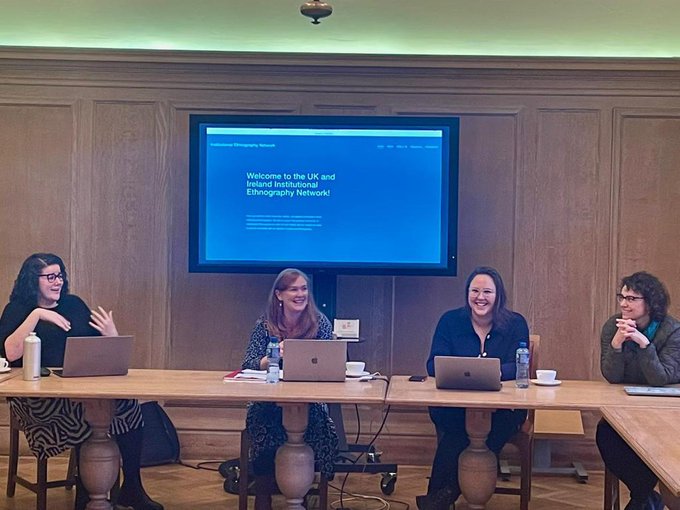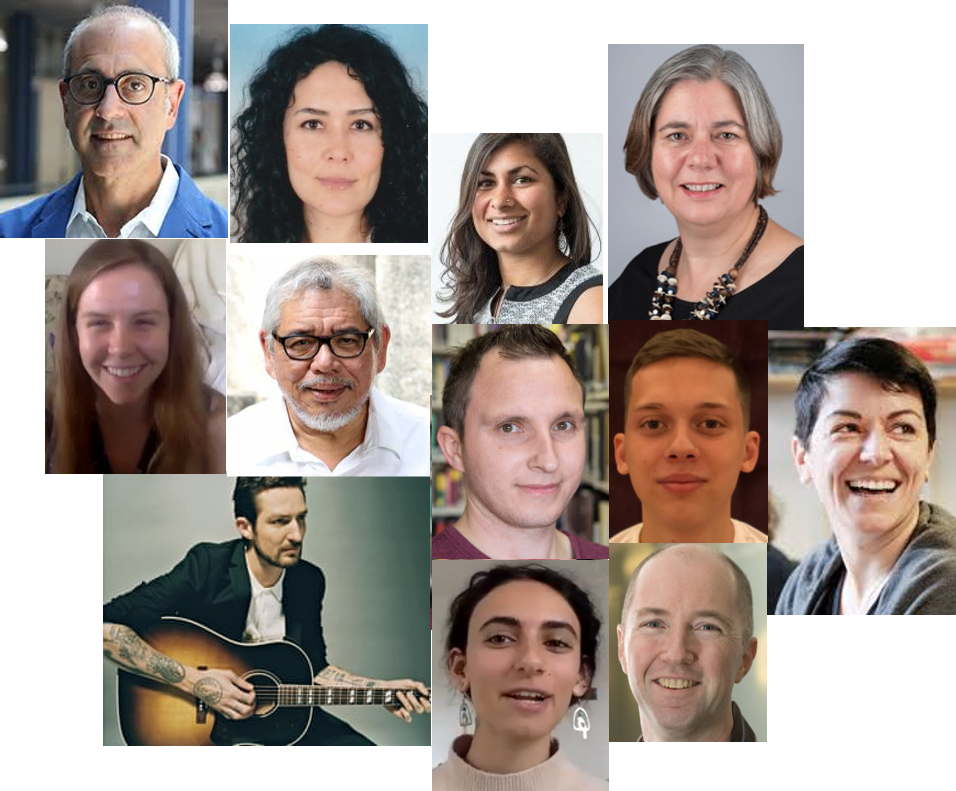There is an absence of support for institutional ethnographers, and certain features of the field itself make it an ideal breeding ground for imposter syndrome. The Institutional Ethnography Network wants to change that, writes Órla Meadhbh Murray, Gráinne P Kearney, Adriana Suárez Delucchi and Liz Ablett.
Am I a proper institutional ethnographer? Have I read enough of the literature? Do I understand it? What if a more senior scholar doesn’t like my work? Will anywhere publish it? Am I an imposter?
These questions haunt the interdisciplinary field of institutional ethnography (IE), an approach to research initially developed by feminist sociologist, Dorothy E Smith, alongside colleagues and students in Canada. While feeling like an imposter is common in academia, particularly when using a new methodology or theoretical approach, we argue that the ‘imposter institutional ethnographer’ is a particularly pervasive figure and needs attention when teaching IE. Due to the dispersed nature of the field across countries and disciplines, those who are new to IE often face difficulties accessing formal training, supervisory support, and opportunities to meet other IEers. This was the experience of all four co-authors of this piece, who through various means found each other and began building a network to support institutional ethnographers in the UK and Ireland. This resulted in the UK and Ireland Institutional Ethnography Network (IEN), launched through a hybrid event at Queen’s University Belfast in October 2022.
What is institutional ethnography?
Institutional ethnography (IE) researchers aim to find out how the social world works. It begins in people’s daily experiences and looks at how people are (re)producing the social world and how this is coordinated, often by institutional texts and language that originate in other places and at other times. IE focuses on the work that people do to translate their actual lives into institutionally recognisable formats and languages in order to access things like state welfare support. IE is interested in this gap between actual experiences and the institutional framing of experience, showing how sometimes we must dispense with our lived experiences and intimate knowledge of the world to fit into institutional categories. If people do not fit those categories or if they translate themselves incorrectly into institutional logics, the consequences can be disastrous: being denied benefits by the state, not being placed on a medical waiting list, or having a visa application rejected. Many institutional ethnography research projects aim to create maps – explanations and/or visualisations of institutions or processes – in order to show people how things work in practice and to identify moments for potential intervention. Thus, IE is both an intellectual project – a sociology – and a powerful tool for activism.
IE is both an intellectual project – a sociology – and a powerful tool for activism.
IE is not merely a method, it provides a specific ontology – a foundational theory of how the social world works – alongside a methodological framework and concepts to guide and direct research. But ultimately, the aim is to find out how things work in order to change them. Many IE researchers are motivated by commitments to social justice and so the impetus to inform change is a powerful driver of this field. The authors of this piece are based at four universities, across three academic disciplines, and research very different topics: medical student assessments (Gráinne), UK university audit culture (Órla), harassment and misconduct in UK politics (Liz), and social environmental conflict in cross-cultural contexts, such as Latin America (Adriana). We also come from different backgrounds and positionalities, yet share a commitment to doing academic research that, ideally, informs transformative action or, more modestly, ensures institutions better serve those they are supposed to.
Learning and teaching as ‘imposter’ institutional ethnographers
There is a lack of formal training in institutional ethnography internationally, with only a small number of dedicated workshops or courses existing, such as the yearly workshop at the Society for the Study of Social Problems (SSSP) conference in the US and Canada, and prior to Dorothy Smith’s death in 2022, her regular workshops in Canada. Since 2020, we have been running IE workshops online, providing intensive training for those interested in this approach with a particular focus on how to put IE into practice in the participants’ own research contexts and how to do text analysis within IE research. We set up the workshops due to a scarcity of support and training but have felt like IE ‘imposters’ in positioning ourselves as authoritative voices on IE, who fuel expectations of confident expertise and knowing all the answers. Increasingly, scholars have begun interrogating ‘imposter syndrome’ in higher education; what it feels like, how it is unevenly experienced, and how it impacts people and creativity in knowledge production (Addison, Breeze and Taylor, 2022; Murray, 2022). Imposter feelings come up in the workshops, both in ourselves and in workshop participants, and we have tried to accommodate this vulnerability by acknowledging it and providing a space for trial and error. We use text analysis activities in the workshops to allow participants the space to try out the methods and then discuss what worked and what did not for their purposes. We try to create a low-stakes, supportive environment for participants to experience the uncertainty of working with a new approach within the workshop. This can help move through the difficult, messy beginning of trying a new approach with the support that is often lacking beyond the workshop space. While learning any new approach can be uncomfortable, there are particular issues around learning and teaching IE which produce imposter feelings.
Firstly, the interdisciplinary nature of the field means that IE scholars have to constantly translate their work across disciplinary, geographical, political, and, increasingly, language contexts, as IE grows in popularity in different regions and beyond the English language. The very words we use to describe our research topics, methods, and theoretical frameworks carry histories and implications that can alienate people, foster misunderstanding, or generate multiple interesting interpretations. To translate IE clearly to different audiences requires a level of confidence and dexterity with IE concepts that is difficult to develop in a short space of time (such as during a two-day workshop or even over the course of a PhD), particularly without support.
Secondly, there is a tension between students wanting clarity about “how to do” IE and the non-dogmatic flexibility of IE as an entire approach rather than a specific method. Students must become confident in their understanding of the fundamental principles before applying it to their research question or area. Each IE project is very different and so it is difficult to compare or know if you are doing it right without a supportive IE network of peers and mentors to reassure you and provide constructive criticism.
Thirdly, there are very few senior IE scholars with secure jobs to provide mentorship and support to students and junior scholars who are new to the approach. This seems to be a problem across countries based on many informal conversations we have had with new IE scholars. Mentors can be particularly important in alleviating imposter feelings and encouraging more confidence in using IE, particularly when applying fundamental principles to one’s own project. It is this absence of support that we are responding to through our IE network.
The Institutional Ethnography Network (IEN)

The Institutional Ethnography Network (IEN) based in the UK and Ireland aims to provide a space for anyone interested in IE and the work of Dorothy Smith. We are currently producing introductory videos on IE in English and Spanish (a language into which none of Dorothy Smith’s books have yet been translated) and creating illustrated resources to visualise IE concepts. We hope to provide an interdisciplinary, pluralistic, supportive, and non-dogmatic space for people to learn about IE and how it can provide a way to do research. For example, by developing peer-to-peer, work-in-progress support sessions for those undertaking IE projects, providing open-access, illustrated, and multi-lingual resources on our website, and co-writing to facilitate confidence building and collective support structures for institutional ethnographers. We also provide some of the only regular introductory training to IE globally through the National Centre for Research Methods.
_____________________________________________________________________________________________
This post is opinion-based and does not reflect the views of the London School of Economics and Political Science or any of its constituent departments and divisions.
_____________________________________________________________________________________________
Main image: Robert Anasch on Unsplash





